Hey friends, Barbarella here. When Alejandro Hidalgo’s The House at the End of Time came out years ago, it became one of my favorite horror films of the decade, and it's now one of my favorite horror films of the past two decades. It wasn’t just that it was beautifully shot in and around a striking house, or that it weaves some creepiness throughout. Instead, it’s the unique way the story unfolds that elevates it and makes it a fully satisfying film. If you haven’t seen it, you could (and should) check it out now as it's currently on a variety of streaming platforms.
The talented Venezuelan filmmaker directs another film, THE EXORCISM OF GOD, written by him and Santiago Fernández Calvete. Including some different ways of contemplating possession and exorcism, the English-language film tells the story of American priest Peter Williams, working in Mexico, plagued by a dark secret, and confronted with a job that forces him to face his past. I had the pleasure of speaking with Alejandro about the film. Check it out.
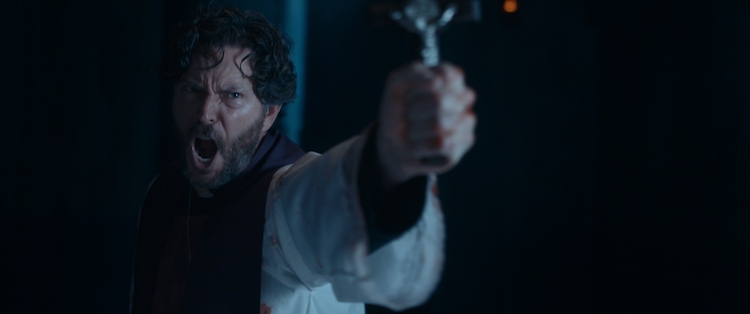 The Exorcist set an incredibly high bar for exorcism films, and I always kind of worry for filmmakers who decide to do a film about exorcism because you're never going to get back to that level. What made you decide to do a film on this topic?
The Exorcist set an incredibly high bar for exorcism films, and I always kind of worry for filmmakers who decide to do a film about exorcism because you're never going to get back to that level. What made you decide to do a film on this topic?
“Well, my purpose is never to surpass a masterpiece like The Exorcist that, as you said, is totally impossible. But as I am a big fan of that movie, I wanted to have fun making one and basically creating a story that I feel is really powerful and filled with amazing horror moments and also with a story that is quite interesting, exploring human dilemmas, human conflict. I feel we created a film that it's not surpassing The Exorcist, but it's something that you can have a great time watching with some popcorn, having amazing scares. [It also has] a story that will bring some reflection, some thoughts, some debates. That's what I feel art is about.
"This is my own homage to The Exorcist. It was always a dream, since I was a little kid, to make a film like that. I really feel happy with the result. I never had the ambitions of changing the genre, but to bring very cool and original twists, and I feel we did it.”
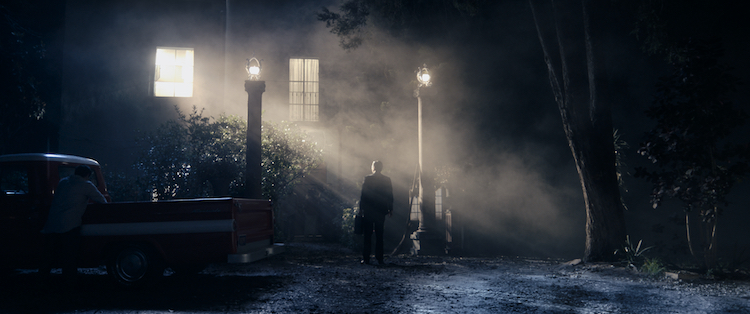 Yeah. So you also utilized some beautiful locations. I love that you chose to shoot some of this in a prison. What kind of factors did you have when you're determining where you wanted to film?
Yeah. So you also utilized some beautiful locations. I love that you chose to shoot some of this in a prison. What kind of factors did you have when you're determining where you wanted to film?
“Well, I wanted to bring to America a very different setting. All the horror movies we see in America are set basically in America, and I feel there is a very special, unique, and beautiful universe in Latin America. My original intention was to shoot this film in my own country, Venezuela, that is a beautiful country with amazing paradise locations. It was not possible because of the crisis, because of the dictatorship and social implosion we had just a few months before shooting the movie. I had to move to another location, and I found Mexico the perfect place because it has beautiful places. It has very amazing, talented people. It was great because in Mexico, like all the Latino countries, we see people struggling and having hard times with poverty and crisis. The film shows you that but also shows you the beauty in those places.
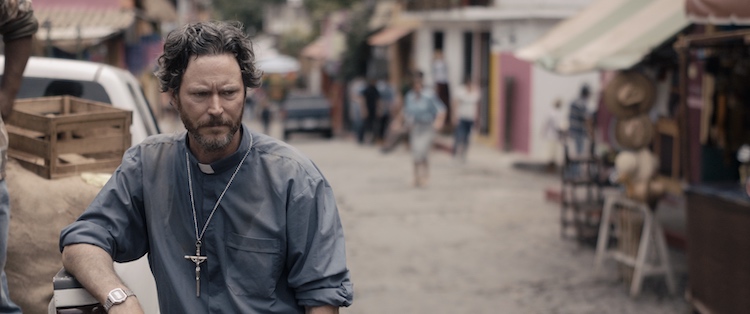 “Also, our protagonist Father Peter is American, but he falls in love with Mexico. He doesn't want to leave Mexico. He loves the people. He loves how warm they are. I think that is a very important message, especially when, in that moment, we had a president who was basically dividing America from Mexico by building a wall. I was very excited to create a universe and a horror film that brings and connects different cultures in a beautiful place like Latin America.
“Also, our protagonist Father Peter is American, but he falls in love with Mexico. He doesn't want to leave Mexico. He loves the people. He loves how warm they are. I think that is a very important message, especially when, in that moment, we had a president who was basically dividing America from Mexico by building a wall. I was very excited to create a universe and a horror film that brings and connects different cultures in a beautiful place like Latin America.
“Regarding the prisons in Latin America, they are really creepy, no human rights. They are in very poor conditions, and I wanted to show that or use it as a convention in a horror story. I wanted to show the beauty, but also our own trials and dark situations. And I feel we did it.”
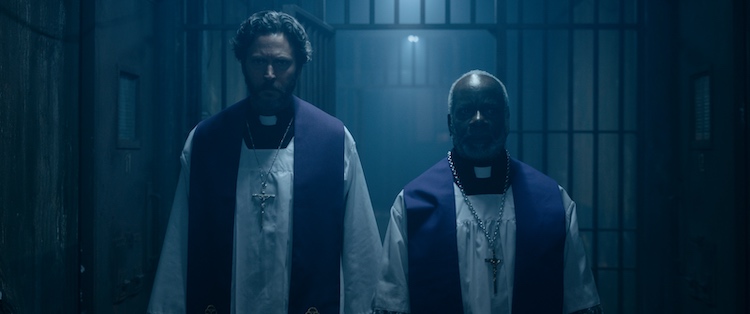 Yeah. The score is also incredible. Would you share some insights into some of the conversations that you had with the composers about that?
Yeah. The score is also incredible. Would you share some insights into some of the conversations that you had with the composers about that?
“I worked with two amazing Venezuelan composers. One of them was working remotely from Venezuela. The other one was in LA. Basically, we wanted to build something special and unique. It had to be classic because the film is set in a very classic horror setting. We also wanted to create a very original atmosphere, so sometimes we brought sci-fi elements. When we showed the hallway that goes to Esperanza's cell, I felt like we created something in the tone of, I don't know, a Blade Runner, something like that, but with horror elements and voices. Basically, I wanted to mix the beauty of an orchestra - that's why we worked with the Budapest Orchestra - with some disturbing electronic atmosphere. We mixed contemporary and classic elements together with the composers to create something really unique, terrifying, disturbing, but also emotional."
We've seen tons of images and variations of Jesus, but I don't think I've ever seen a demon-like Jesus, and I found that really disturbing. Where did you come up with that idea?
“Well, I was raised Catholic. I was a little kid when I watched The Exorcist for the very first time. I remember there is a scene when a priest is coming into the church, and the image of the virgin was corrupt. That image was really disturbing to me because when I was praying to the virgin, that image came to my mind. I felt guilty and corrupt thinking about [something] dark when I was praying to the virgin in that moment.
"It also started happening with the Jesus, because Jesus wrote an amazing and very important message of love of humankind that we really need, but the figure I was praying to when I was a kid was a man crucified, full of blood, full of wounds, and that's really disturbing. That image was terrifying me when I was a little boy. And when I grew up and developed my devotion and passion for the genre, I wanted to share it to scare other people. Based on the results at the box office in Latin America, I think it's working very powerfully. In Brazil, we were in number one, in Mexico, number three. People have been really shocked and scared by that. Some people even are offended. I don't want to insult the people's faith. That's not truly Jesus. That is the demon playing with your own fear, and what is the worst fear for a man of faith? It is basically to see that faith totally corrupted and converted into something diabolical and dark. I feel that brings something really unique and special for a horror movie that basically wants to scare and to create a very powerful and emotional impact.”
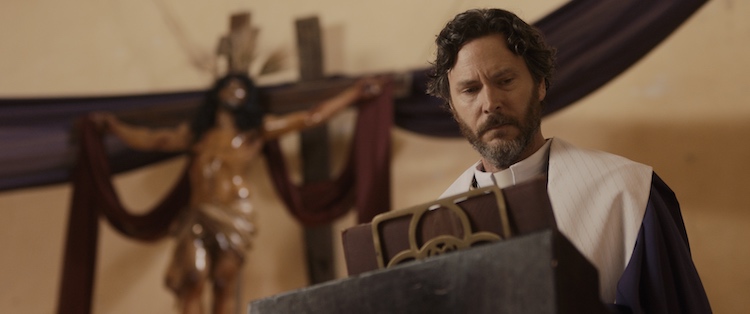 How much of a role does religion play in your life now?
How much of a role does religion play in your life now?
“I don't consider myself a religious person. I consider myself a spiritual person. I believe in God. I believe in the source of everything. I believe we all are connected in some way. I am not religious, but I also still follow some of the lessons we got from Jesus. I feel like forgiveness, for example, is one of the most important and powerful manifestations of love. When you're capable to forgive others and to forgive yourself and to love others as much as you love yourself, you will be loving God. I think I'm using the religion and the Catholicism as a metaphor to talk about how can we expel God, the love from ourselves by committing sins and falling into temptation and hurting other people? I don't even believe in demons, but when I see a movie, if I see an amazing story with a dragon, aliens, or demons, I get into that universe. That’s basically what I'm trying to do with this horror film.”
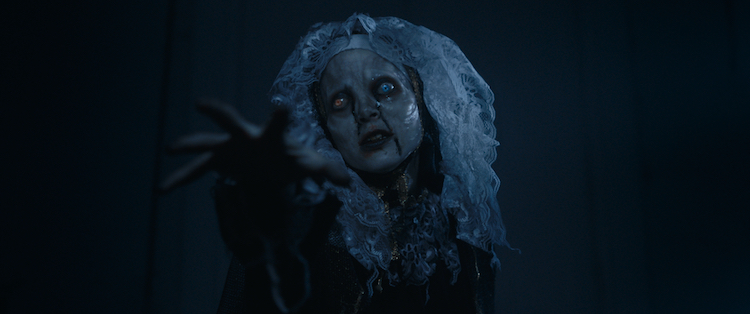 Yeah. This was your first time directing an English-language film. What kind of unexpected obstacles did that present for you?
Yeah. This was your first time directing an English-language film. What kind of unexpected obstacles did that present for you?
“I had to split my in brain two, and I was talking to the DP in Spanish and then to the actor in Spanish. [Then I realized,] “No, no, no, no. English (for the actor). Sorry. “ That was so tough. I had to be talking in the two languages all the time, but I was very passionate to do it. I mean, after all the success I had with The House at the End of Time, and [having] the possibility of developing a remake in the US or making films in Hollywood, I was trying to force myself to give my best and make an English-language movie. I feel love for tons of Hollywood movies, and I want to bring my own stories, my original vision to the industry. I also want to connect with American audiences by bringing them some of the beauties of our own universe in Latin America. So, yeah, I accepted the challenge. I did my best, and I just hope the people from America enjoy this horror movie.”
Are you planning on sticking with the horror genre?
“Yeah. Yeah. As I said, I'm working very hard developing the remake of The House at the End of Time. I think that is a very powerful and beautiful story that deserves to be told and to reach a bigger distribution and to connect with audiences worldwide. I am attached to a couple of projects. One of them is called Cut Pool. It will be shot in Ecuador, in Tayos Cave - that's an out-of-this-world place, and it also explores a mixing of genres. It's like an adventure, but horror movie. Also, I have been working with doing the development of a film called The Vessel that was written by an amazing screenwriter, Paul Boardman, who was the guy who gave us that masterpiece called The Exorcism of Emily Rose.”
I’m looking forward to seeing these projects, as I’m excited to experience Latin America through the eyes of Alejandro Hidalgo. THE EXORCISM OF GOD will be in theaters, on demand and digital on March 11, 2022. In the meantime, you could always check out The House at the End of Time, which is available now on a variety of streaming platforms, including Peacock, Hoopla, VUDU, Amazon, and Google Play. See both trailers below.
Exorcism of God
The House at the End of Time
